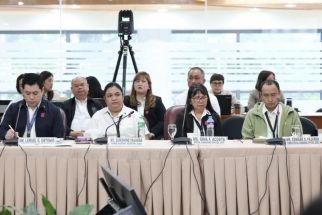Vacant plantilla positions ‘milking cows’ for bonuses – lawmaker

MANILA, Philippines — Plantilla positions in the government are already funded annually so they have become “milking cows” for year-end bonuses when left vacant, a member of the House of Representatives said yesterday.
Bohol 3rd District Rep. Alexie Besas Tutor, House committee on civil service and professionalization chair, said “vacant positions have become milking cows for the mid-year and year-end bonuses and incentives distributed among the regular government employees.”
“These vacant positions are budgeted every year in the annual appropriations. Keeping them unfilled distorts the national and local budgets,” Tutor said.
She pointed out that the Civil Service Commission (CSC) should notice that many government agencies and local government units (LGUs) have not hired people to fill these vacancies.
Some unfilled positions are also being reserved for personnel nearing retirement, because by keeping the vacant positions open, agencies and LGUs are “able to free up some funds for the hiring of consultants,” explained Tutor.
“These matters are a big part of the problem and a real obstacle to ending endo in government. These issues have cropped up time and again during the budget hearings, including the hearings for the 2023 budget,” she said, referring to the practice of hiring contractuals and their regular turnover so as to avoid giving benefits.
Contractualizaton
So far, Tutor’s committee has approved 11 bills seeking to end contractualization in the government sector.
She said the CSC should complete its study on job orders and contract of service personnel by January 2023, which affects over 66,000 individuals nationwide.
She said results of the study could be considered in the deliberations on the 11 proposed measures.
“It was very clear in the hearing of the House committee… that our colleagues in Congress are adamant about ending ‘endo’ (a term for contractualization) in the national government and local government. There is a strong consensus in the committee and we have the support of many of our colleagues in the House,” said the lawmaker.??
Crucial role of HR
Meanwhile, CSC Chairman Karlo Nograles stressed the critical role of human resource (HR) management as the public sector workplace faces transformations brought about by the COVID-19 pandemic.
In his virtual keynote message at the conference on public sector productivity hosted by the Development Academy of the Philippines (DAP) yesterday, Nograles called on the HR departments of government agencies to be more efficient and strategic in their policies as well as adaptive to digital transformation.
“HR was given the chance to strengthen its role and to contribute in ways that will be more effective and more valued than ever before. Instead of seeing the glass as half-empty, organizations, which include our government offices, are allowed to implement changes with HR at the forefront,” Nograles said.
Nograles said HR management must help government workers develop new and emerging skills “to support and sustain their competencies and capabilities” as civil servants and to “keep up with the shifts and transformations brought about by ever-evolving times.”
In line with developing a more efficient and strategic HR management, Nograles cited the CSC’s Program to Institutionalize Meritocracy and Excellence in Human Resource Management or PRIME-HRM which, he said, promotes the adoption of digital transformation.
“This program is also a strategic initiative to push for digitization as it is designed to phase out paper-pushing and manual processes, so that HR in public organizations can focus on developmental initiatives,” he said.
Nograles also cited the CSC’s expanded Learning and Development (L&D) programs.
“We advocate for inclusive learning by cultivating and embracing diversity, upholding equity and fostering belongingness. We expand our L&Ds by ensuring that learning gaps are met and fulfilled regardless of diverse backgrounds,” he said.
Nograles said there is a growing demand for e-learning and an increased focus on building “future-readiness” among employees.
“Ultimately, the goal of these L&Ds is to help shape a future-ready human capital that is involved, engaged, socially responsible, performance-oriented, assertive and innovative. We develop the talents of the future that can handle adversities and adapt and adjust to the new era of governance,” he said. – Elizabeth Marcelo
- Latest
- Trending

































